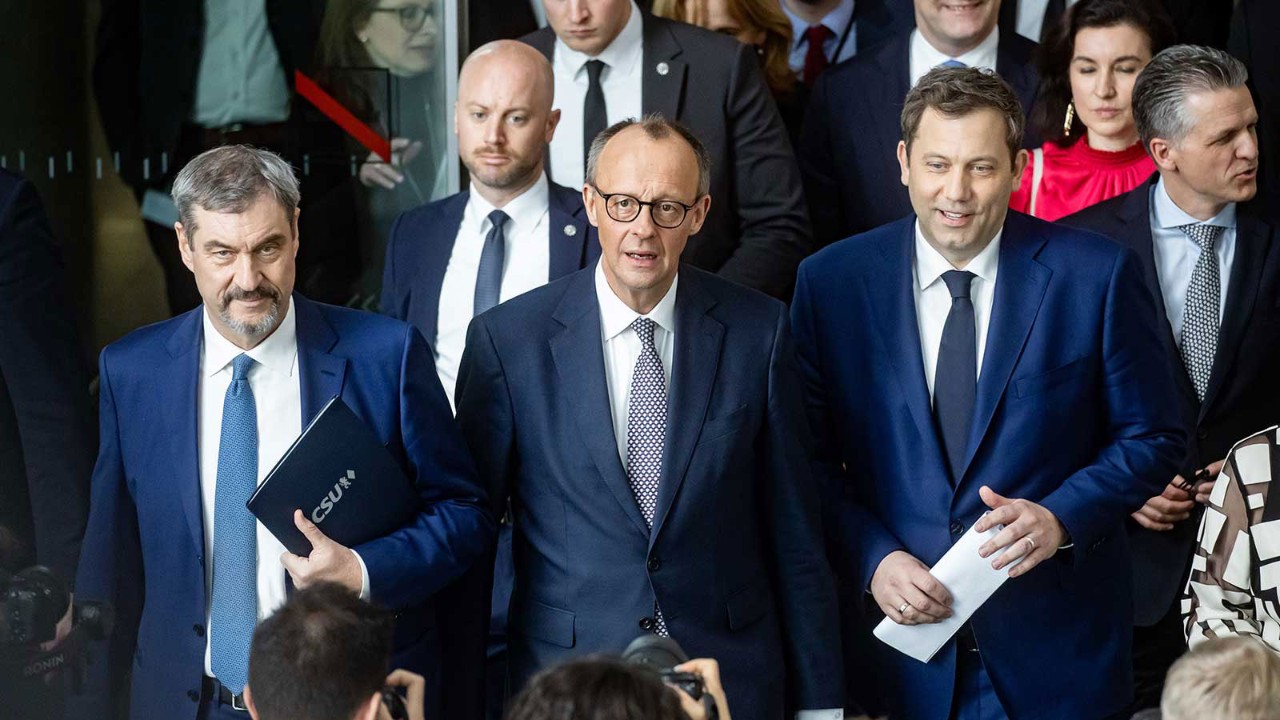
Germany has a well-deserved reputation as a fiscal disciplinarian – with a long-standing aversion to debt and fondness for balanced budgets. But in 2025 the nation is undergoing something of a personality change.
Following his victory in February’s federal elections, chancellor-in-waiting Friedrich Merz declared that Europe must become more strategically independent from the US, a country he claimed had ‘lost interest in the fate of Europe’.
That vision struck a chord in Berlin – but it comes with a price tag. Lawmakers have now approved a package that looks set to unleash more than €1trn of government spending into defence and infrastructure.
‘It will be critical that this wave of public money is efficiently deployed to achieve its goals’
‘While it is not 100% clear yet how much will be spent, the scale looks unprecedented in modern German history since reunification,’ says Mathias Oberndörfer, head of the public sector for KPMG in Germany.
‘This spending will ripple through transport, energy, IT and defence, giving it the potential to trigger a broader renaissance in industrial policy.’
The fiscal boost has significantly helped lift some of the gloom over German economic stagnation and also boosted the growth prospects of the entire Eurozone region. But the scale and complexity of these investments also create a once-in-a-generation opportunity for accounting and advisory firms to play a pivotal role in execution and oversight.
Source: IMF Fiscal Monitor, October 2024
It’s not just the magnitude of the government’s programme that should be of interest to accountants and consultants, says Oberdörfner. It is also the way it plays to their strengths.
‘It will be critical that this wave of public money is efficiently deployed to achieve its goals,’ he argues. ‘That means both government and firms setting up rock-solid procedures, monitoring spending, mitigating risks, and setting up digital systems. These are all areas where accountants are central. And it’s a chance for them to play a part in a historic moment for Germany.’
Getting the ball rolling
Starting with the basics, there is a huge need to get programmes up and running, and to staff them effectively, says Oberndörfer. ‘Professional services firms and accountants will play a key role — especially those who can help with AI and digital tools. They can support both industry and government in shaping programmes, setting criteria and building capacity.’
One of the most immediate bottlenecks will be procurement. German and EU public procurement rules are notoriously complex. ‘The issue is no longer whether the money is there,’ Oberndörfer explains. ‘It’s whether it can be spent efficiently and in the right places.
‘That’s where procedures, compliance and trustworthy partners become essential. Accounting firms can provide procurement advisory services, compliance support, and the digital tools to ensure the right outcomes.’
He notes that infrastructure and defence projects, in particular, are prone to delays, cost overruns and misalignment. Firms can step in to set up governance systems, train officials and manage complex procurement processes to reduce these risks.
Guardians of ESG
It is also notable that defence and infrastructure are areas in which ESG (environmental, social and governance) concerns can loom large. This is a realm in which accounting firms have been placing greater emphasis. But Oberndörfer stresses that ESG today goes far beyond environmental goals.
Firms will be called on to help public bodies define clear ESG criteria
‘When you talk about defending democracy or the constitution, that’s also part of ESG – especially the social and governance dimensions,’ he says. ‘Accountants have a role not only in attesting to ESG reports, but also in setting up the systems, governance structures, and internal controls needed to ensure the money flows where it is supposed to.’
Given that ESG requirements are written into the €500bn infrastructure fund, firms will be called on to help public bodies define clear ESG criteria and support private contractors in meeting them.
Digital, data and defence
Germany has long lagged in e-government and data infrastructure. As part of the fiscal renewal, digital investment is now being prioritised, especially in defence and critical infrastructure.
Here too, accounting and advisory firms can help build platforms for procurement, automate compliance checks, and integrate real-time project dashboards. More broadly, they can advise on how to structure public sector digital strategies and train officials to make the best use of new technologies.
Consulting market shift
Oberndörfer believes the shift will reshape the consulting and accounting market itself. ‘Firms may have to work closer together to scale up capabilities or specialise to serve specific programmes. We need a whole ecosystem of national and international big players and boutique firms.’ German spending will draw on suppliers from across the Eurozone, the government’s package will generate opportunities for accountants for the region more broadly.
Germany’s bold fiscal departure is just the starting point
One of the most pressing internal challenges will be attracting and retaining talent. ‘To deliver all of this, we have to explain how accounting and advisory firms are crucial to making the vision of lawmakers a reality,’ says Oberndörfer.
The bottom line is that Germany’s bold fiscal departure is just the starting point. To deliver the transformation the government is hoping for, Germany will have to deliver on execution. This will require skills and knowledge that accounting and professional services firms are uniquely positioned to provide.



